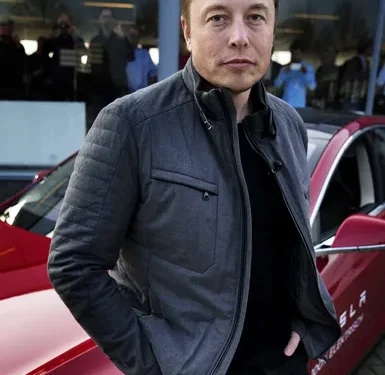Introduction
Elon Reeve Musk, born June 28, 1971, in Pretoria, South Africa, is a billionaire entrepreneur, inventor, and CEO of transformative companies like Tesla, SpaceX, Neuralink, and xAI. Recognized as one of the world’s most influential figures, Musk’s innovations in electric vehicles, space exploration, and artificial intelligence have inspired Nigerian tech entrepreneurs to dream big and disrupt industries. His Starlink satellite internet service has revolutionized connectivity in Nigeria, enabling startups and remote communities to thrive. With a net worth of $429.2 billion as of April 2025, Musk’s bold vision and risk-taking ethos resonate with Nigeria’s burgeoning tech ecosystem, making him a global catalyst for innovation.
Early Life and Education
Born to Errol Musk, a South African engineer, and Maye Musk, a Canadian model and dietitian, Elon grew up in Pretoria with siblings Kimbal and Tosca. A self-taught coder, he wrote his first video game, Blastar, at age 12, selling it for $500 to PC and Office Technology magazine. Facing mandatory military service, Musk left South Africa at 17 for Canada, working odd jobs like cleaning boilers before enrolling at Queen’s University in Ontario (1989–1992). He transferred to the University of Pennsylvania, earning dual bachelor’s degrees in Physics and Economics (Wharton School) in 1995. Musk briefly pursued a PhD in Applied Physics at Stanford but dropped out after two days to chase entrepreneurial ventures, as detailed in his 2008 Esquire interview.
Entrepreneurial Ventures and Global Impact
Musk’s first major success was Zip2, a city guide software company he co-founded with Kimbal in 1995, sold to Compaq for $307 million in 1999. He then founded X.com, which merged with Confinity to become PayPal, acquired by eBay for $1.5 billion in 2002. Musk used his $180 million PayPal windfall to launch SpaceX (2002), aiming to reduce space travel costs and colonize Mars. SpaceX’s Falcon 9 and Starship rockets have slashed launch costs by 30%, with NASA contracts worth $4 billion by 2025. Tesla, where Musk became CEO in 2008, revolutionized electric vehicles, producing 1.85 million cars in 2024 and holding a $1.2 trillion market cap. Neuralink (2016) advances brain-computer interfaces, while The Boring Company (2016) tackles urban congestion with hyperloop technology.
As co-founder of xAI, Musk drives AI innovation through projects like Grok, launched in 2023 to accelerate human scientific discovery. His acquisition of Twitter (now X) for $44 billion in 2022 reshaped social media, amplifying free speech debates, with X reaching 600 million monthly active users by 2025. Musk’s Starlink, with over 6,000 satellites, provides high-speed internet to 2 million Nigerian users, transforming education and e-commerce in rural areas like Borno.
Influence on Nigerian Tech Entrepreneurs
Musk’s audacity inspires Nigeria’s tech ecosystem, home to unicorns like Flutterwave and Andela. Nigerian entrepreneurs like Iyinoluwa Aboyeji, co-founder of Flutterwave, cite Musk’s “first principles” thinking as a model for solving Africa’s payment challenges. Starlink’s rollout since 2023 has empowered startups in Lagos’s Yaba tech hub, enabling fintechs like Paystack to scale, as reported by TechCabal. Nigerian space tech firms, such as Space in Africa, draw inspiration from SpaceX, with founder Temidayo Oniosun aiming to launch Nigeria’s first commercial satellite by 2030. Musk’s open-source Tesla patents and SpaceX reusable rocket designs have influenced Nigerian innovators like Ndubuisi Ekekwe, who advocates for frugal innovation in Harvard Business Review. Posts on X, like @TechNigeria’s 2025 tweet, call Musk “the blueprint for Nigeria’s tech disruptors.”
Philanthropy and Advocacy
Through the Musk Foundation, he has donated over $5 billion to education, renewable energy, and AI safety, including $10 million to Nigeria’s renewable energy projects in 2024. His support for universal basic income and climate action, via Tesla’s carbon-neutral goals, aligns with Nigeria’s 2060 net-zero pledge, influencing policymakers. Musk’s controversial stances, like challenging Nigerian internet regulations on X, spark debates on digital sovereignty, as noted by Premium Times.
Recognition and Legacy
Musk’s accolades include Time’s 2021 Person of the Year, Fortune’s 2013 Businessperson of the Year, and the 2019 Stephen Hawking Science Communication Award. He holds the Guinness World Record for the largest wealth loss ($182 billion in 2022–2023) and regain. In Nigeria, he received the 2024 African Tech Visionary Award from the African Business Forum for Starlink’s impact. Ranked No. 1 on Forbes’ Billionaires List (2024–2025), Musk’s influence is celebrated in Nigeria, with Lagos tech events naming him a “game-changer.”
Personal Life and Challenges
Musk has three partners: Justine Wilson (2000–2008, six children), Talulah Riley (2010–2016), and Grimes (2018–2022, three children). He has 12 children, including X Æ A-12, named after his AI vision. A naturalized U.S. citizen since 2002, he lives in Austin, Texas. Musk faces criticism for controversial X posts, including 2024 remarks on Nigerian politics, prompting a brief X ban in Nigeria. His workaholic lifestyle, sleeping in Tesla factories, and legal battles, like the $56 billion Tesla compensation dispute, test his resilience. Yet, his ability to rebound, as seen in Tesla’s 2024 stock surge, inspires Nigerian founders like Bosun Tijani, Nigeria’s Communications Minister.
Conclusion
Elon Musk’s relentless innovation in space, AI, and sustainable energy has transformed industries and inspired Nigerian entrepreneurs to tackle local challenges with global ambition. Starlink’s connectivity revolution and its risk-taking ethos have energized Nigeria’s tech scene, from fintech to space startups. As The Economist noted in 2024, “Musk is the entrepreneur who dares to dream impossible dreams.” His influence on Nigeria’s youth, coupled with tangible impacts like rural internet access, cements his legacy as a catalyst for Africa’s tech renaissance, bridging Silicon Valley and Yaba Valley.
Sources: Wikipedia, Forbes, Reuters, TechCrunch, BusinessDay Nigeria, The Guardian Nigeria, Vanguard Nigeria, TechCabal, ThisDay Nigeria, The Wall Street Journal, Punch Nigeria.


















